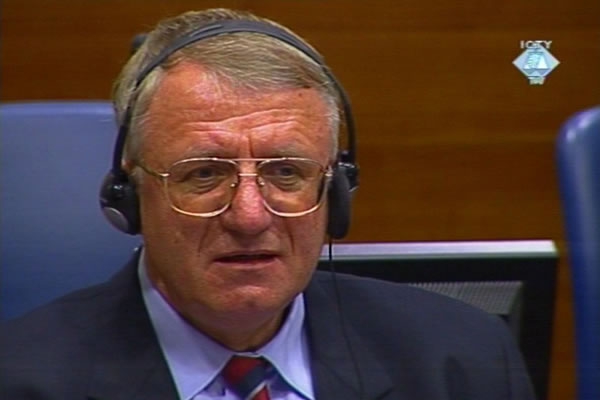Home
‘SERBS IN CROATIA DIDN’T KNOW’ SESELJ BEFORE THE WAR
In the beginning of his cross-examination, Vojislav Seselj got the protected witness VS004 to confirm that the reason why Serbs in Croatia were afraid in 1990 was not the inflammatory rhetoric he practiced in Belgrade, but the actions of the new Croatian government
 Vojislav Seselj in the courtroom
Vojislav Seselj in the courtroom Former official of Serbian Democratic Party in Western Slavonia is testifying at the Vojislav Seselj trial under the pseudonym VS 004 and with image and voice distortion as protective measures. He continued his evidence today. In late 1991 and early 1992, he heard of the crimes in Vocin, Hum, Balinci, Cetekovac and other villages in Western Slavonia. He had no direct knowledge of the crimes, but heard that Croatian civilians were beaten up and killed there. Croatian houses and Catholic churches were set on fire and destroyed. These crimes were ascribed to ‘Seselj’s troops’ – the Serbian Radical Party volunteers – and local extremists from the Territorial Defense, he added.
Seselj objected, saying that this part of evidence was ‘hearsay’, because the witness spoke of what he had ‘heard’ or ‘learned’ and not what he himself had personally seen. The judges overruled the objection noting that hearsay evidence was admissible before the Tribunal. The prosecution corroborated the witness’s testimony with a report of an NGO, the Helsinki Watch. The report lists the same crimes. The prosecution also tendered into evidence a criminal report filed by military prosecutor Milan Stevilovic against the perpetrators of the crime in Vocin and some other villages in the area. ‘Serbian extremists’ killed Stevilovic soon afterwards, near Banja Luka. The witness described the military prosecutor as decent man and officer. People said that ‘he put his nose where it shouldn’t go’, the witness said.
In the beginning of his cross-examination, Seselj got the witness to confirm his argument that in 1990 Serbs in Croatia were afraid because of the actions of the new Croatian authorities and not because of Seselj’s inflammatory speeches in Belgrade. The witness also confirmed that in 1990 ‘the Croatian Serbs didn’t know at all’ who Seselj was. At the first democratic elections, they voted for the former communist party, Party of Democratic Change. Only later, when they felt ‘tricked by Racan’ and ‘threatened by Tudjman’, did they turn to the Serbian Democratic Party in droves.
Seselj then listed dozens of reasons why Serbs had felt threatened in Croatia in 1990, and the witness confirmed them: Tudjman’s rise to power, ‘the restoration of Ustasha iconography’, ‘the rehabilitation of NDH’, ‘the deletion of Serbs from the Constitution’, passing of ‘discriminatory laws’, mass lay-offs of Serbs from the civil service and crimes against Serbian civilians in Sisak, Zagreb and other Croatian cities.
Milan Martic, former president of the former Republika Srpska Krajina, had a similar defense strategy. It didn’t bring him any good as he was found guilty on all counts in the indictment and sentenced to 35 years in prison.
